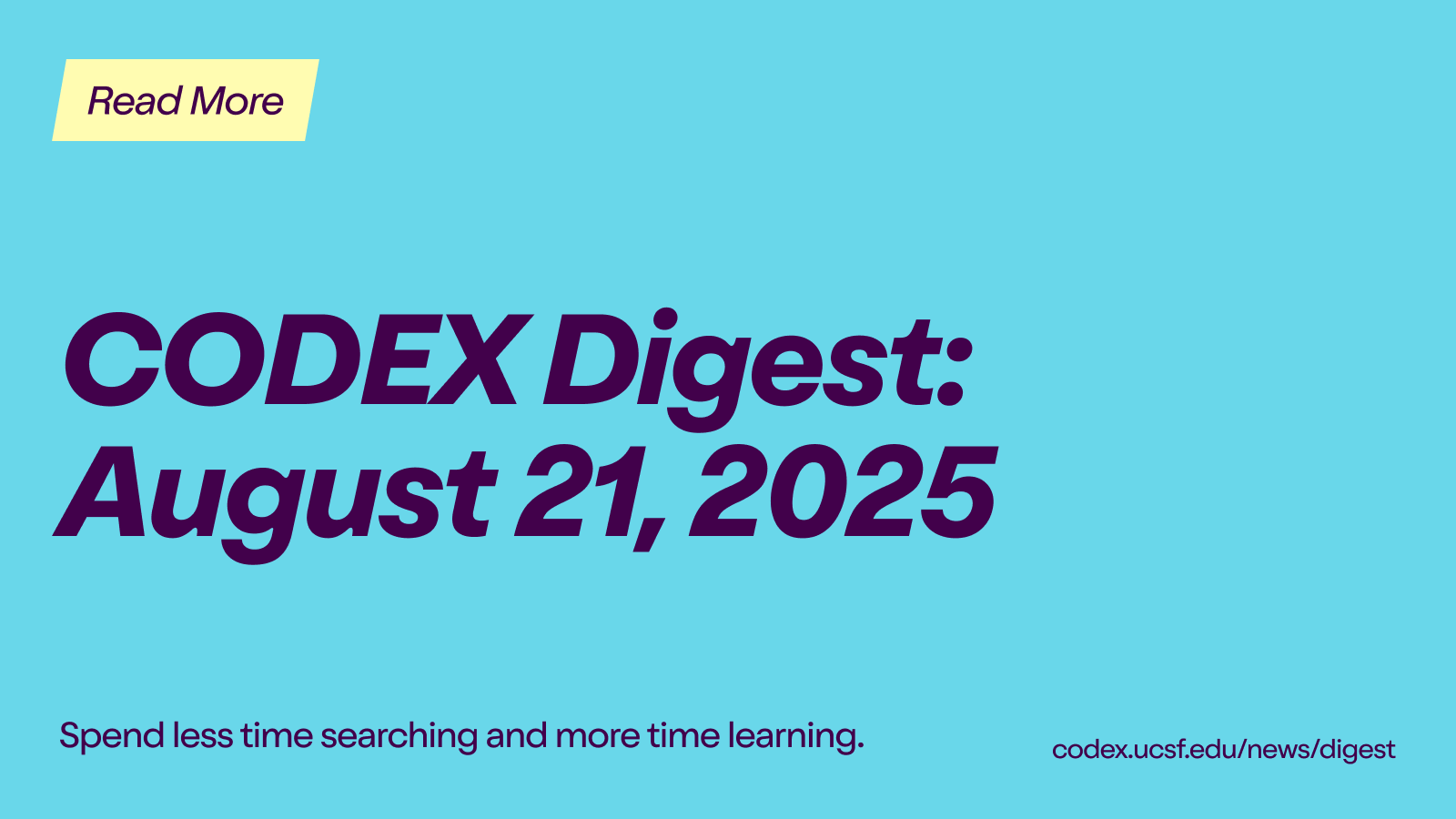CODEX Digest - 8.21.25
Want this delivered straight to your inbox every Thursday? Subscribe now.
This week’s must-reads include a systematic review on diagnosing dementia to a physician's reflections on patients using ChatGPT for medical advice. Also featured are picks looking at the implementation of AI in medical imaging, in developing diagnostic summaries for emergency care, and as a diagnostic tool for medical learners.
Here are this week's must-reads:
Titles link to the PubMed record or free-to-access sites with full text availability.
Briscoe S, Martin Pintado C, Sutcliffe K, et al. Orphanet J Rare Dis. 2025;20(1):303.
Rare disease diagnosis can be challenging in even excellent conditions. This review covering UK studies highlights that people with rare diseases experience diagnostic and access inequities compared to the general population, and inequity is compounded with multiple intersecting marginalized status. Common issues include delayed diagnosis, poor care coordination, and limited information sharing—problems less often seen with more common diseases.
Chen C, Hu Y, Cai W, et al. Int J Med Inform. 2025;203:106029.
Products developed with speech intelligence recognition can be degraded by ambient noise, reducing their completeness, efficiency, and accuracy. This study in a Chinese province uniquely equipped with an integrated standard for prehospital emergency care tested LLMs to develop diagnostic summaries drawn from emergent conditions. The combined technologies reduced errors and summary completion time.
Exploring doctors’ perspectives on generative-AI and diagnostic-decision-support systems.
Esnaashari S, Hashem Y, Francis J, et al. BMJ Health Care Inform. 2025;32(1):e101371.
Physician reception of AI as a diagnostic tool is developing. A randomly selected representative sample of 929 UK physicians was surveyed about their professional knowledge and use of generative AI in 2023. Results show 29 percent had used AI, and diagnostic decision support and generative AI were most commonly used. Notably, 62 percent of generative AI users reported improvements to their clinical decision making and productivity but a minority had adequate training on AI.
Gaebe K, van der Woerd B. PLoS ONE. 2025;20(8):e0325803.
Effective prompting technology can improve diagnostic decision-making. This study looks at how accurately three open-source LLMs performed on clinical cases compared to results previously reported for GPT models on similar diagnostic tasks and how advanced prompt engineering affected the results. This study highlights that proprietary models may underperform compared to open-source models.
National Academies of Sciences, Engineering, and Medicine. National Academies Press: 2025.
Diagnostic excellence education across healthcare is evolving. This workshop examines strategies to reinforce health care professional education (HPE) with an aim toward enhancing the reliability and efficiency of diagnostic processes. Diagnostic reasoning, test use, technologies, patient-centered interaction, and multidisciplinary collaboration were primary components of the conversation.
Computed tomographic screening intervals for patients at moderate risk of lung cancer.
de Nijs K, de Koning HJ, Cao P, et al. JAMA Netw Open. 2025;8(7):e2523044.
Diagnostic excellence encompasses clinical, methodological, and economic components. This economic modeling evaluation examines costs and patient outcomes using three models from the US and Canada associated with either interval or annual screening for patients at risk for lung cancer. The researchers found screening every two years for people under 60 or with less than 30 pack-years of smoking history provided similar benefits to annual screening. Programs with limited resources could consider adjusting screening intervals based on risk.
Ralph LJ, Ehrenreich K, Kaller S, et al. Am J Obstet Gynecol. 2025;233(1):44.e1-44.e15.
This study examines patient vs. clinician diagnostic accuracy in terms of eligibility for medication abortion. The researchers surveyed participants aged 15 and older from nine abortion clinics who spoke English or Spanish and had not yet had an ultrasound. Results show that history-based screening is effective at preventing ineligible people from obtaining medication abortions. However, many people who were eligible rated themselves as ineligible for abortion, illustrating a need for more precise screening questions to balance safety and abortion access.
When patients arrive with answers. (subscription required)
Sundar KR. JAMA. Epub 2025 Jul 24.
Patients who use AI to be informed about their conditions are apt to increase as the public accepts and uses the technology. This narrative about a patient’s use of ChatGPT to diagnose a cause of dizziness argues for physicians to embrace the opportunity AI can provide them to enable deeper conversations and the time needed to build relationships supporting excellent care.
Visser FCW, Kloppenburg-Lagendijk M, Hempenius L, et al. Age Ageing. 2025;54(6):afaf176.
Starting the process to diagnose dementia is sensitive and shaped by fear, reluctance, and stigma. Primary care practitioners (PCPs) use different strategies to begin a patient and family-centered approach to determining the condition and its stage in a patient. To better support patients and families, this review found PCPs need to keep their communication clear, define their roles, and encourage teamwork across professions.
Wenderott K, Krups J, Weigl M, et al. J Med Internet Res. 2025;27:e63649.
AI implementation into radiologic workflows is an emerging area of expertise. This review summarizes what helps and hinders the use of AI in medical imaging. It shows that AI can be useful in clinical care and fit well into everyday practice. However, there is a lack of evidence documenting the factors that aid implementation. The researchers found more content on technology performance with less attention to people and processes, highlighting the need for a more human-centered approach to establishing AI systems in healthcare.
About the CODEX Digest
Stay current with the CODEX Digest, which cuts through the noise to bring you a list of recent must-read publications handpicked by the Learning Hub team. Each edition features timely, relevant, and impactful journal articles, books, reports, studies, reviews, and more selected from the broader CODEX Collection—so you can spend less time searching and more time learning.
Get the latest in diagnostic excellence, curated and delivered straight to your inbox every week:
See past digests here.

